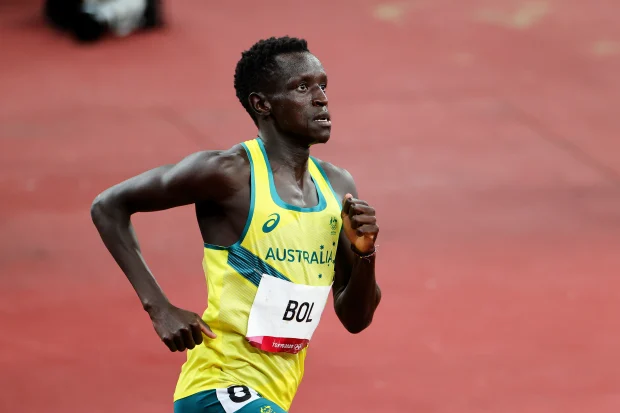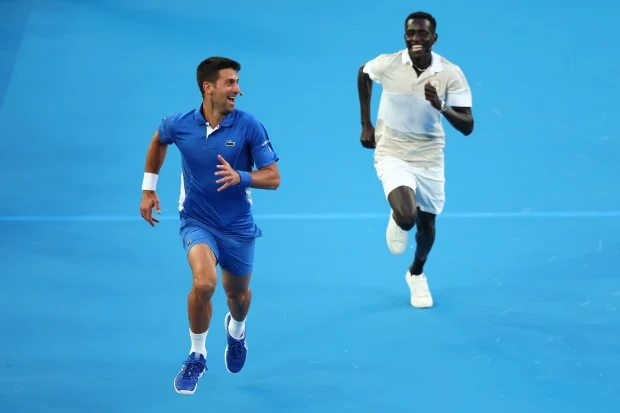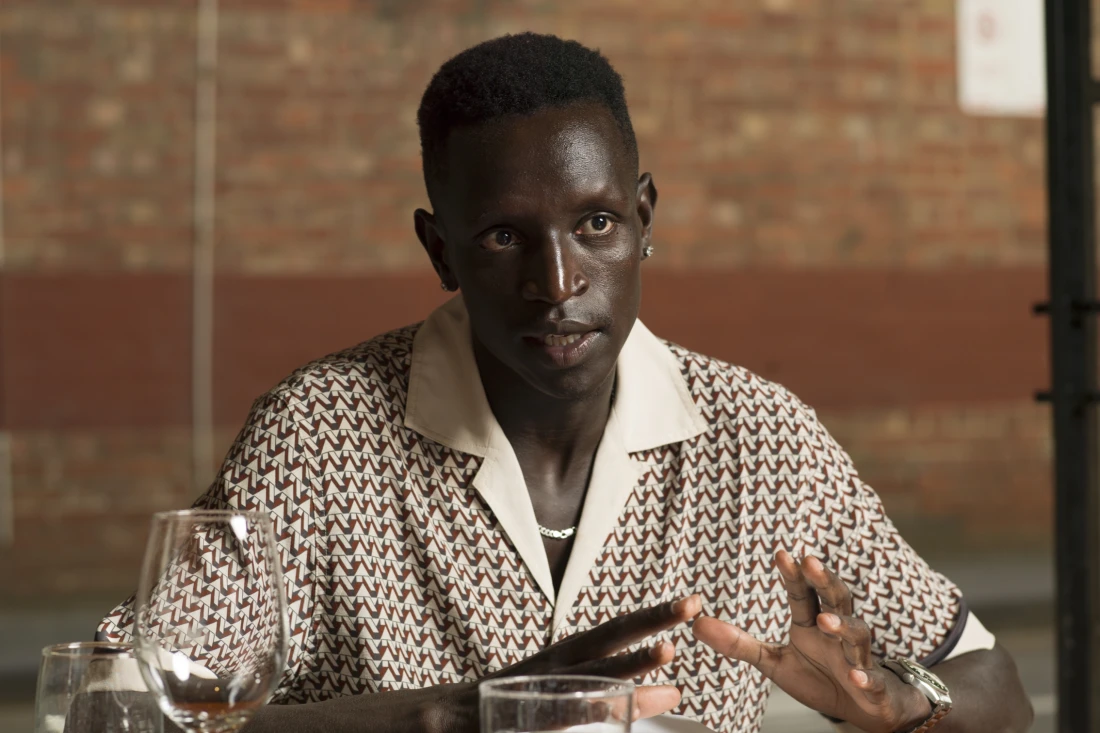Peter Bol’s first love was basketball. Running in the Olympics wasn’t part of the plan. This is already on the public record, of course. But it bears repeating because it makes his success all the more remarkable.
In 2021, Bol became the first Australian in 53 years to compete in the men’s 800m Olympics final. He broke the national record twice in Tokyo on his way to finishing fourth in the final. A silver medal at the Commonwealth Games in Birmingham came a year later. And, in one way, it was all an accident.
The 29-year-old tells me this soon after we settle into our seats at San Telmo, an Argentinian steakhouse a few streets away from Parliament House in Melbourne’s CBD. It’s about a year since the two-time Olympian was temporarily suspended from athletics after a false positive drug test – but more on that later.
The restaurant is clearly a popular spot for business lunches. It’s dark and moody and there are men in suits and women in pencil skirts. Some sink into tan leather banquettes in front of a wall of long mirrors and cow skins. Others lean forward on bentwood chairs, resting their chins on clasped hands as they share anecdotes over bottles of red wine.
It’s a good vibe for a Wednesday afternoon, but we’re not in the thick of it today. The maître d’ has set us up at the back of the restaurant to allow enough space to take photos.
So we’ve got a room to ourselves – one with exposed brick walls, plenty of natural light and a solitary table sitting on a Persian rug – as Bol recounts the start of his athletic career.
An Unexpected Turn
It started with a basketball scholarship at the prestigious private school St Norbert College in Perth. “Honestly, if I didn’t go to that school, I wouldn’t have been a runner today,” Bol says.
Athletics was compulsory at the school, which meant Bol reluctantly ran a few races each year. He found it boring, to begin with. But he also kept winning. He was so good in fact that one of his teachers spent about three years trying to convince him to give up basketball and take up athletics. Her persistence eventually paid off when Bol took up running when he was 17.
He says his early success was driven more by his competitive spirit than his passion for running: “Who didn’t want to be the fastest in school? I loved that,” he says.
He’s just as competitive today. Only now the goal is to be the fastest in the world. But first we need to order some food.
Our waitress recommends some starters because our mains will take at least 45 minutes to come out. And Bol is quick out the blocks, ordering a beef empanada (fried pastry) for each of us and a plate of fried broccolini covered in pecorino shavings. I suggest the ceviche as well, and Bol consents when the waitress tells us it’s kingfish. “Sold,” he says.

Moving to Melbourne
Conversation flows easily with Bol, who is dressed in a brown-and-white silk shirt with a Cuban collar, his two diamond earrings and a large, silver Longines watch sparkling in the sun. He’s relaxed and never far from leaning back in his chair and letting rip an infectious laugh. We bounce around different topics for the next 15 minutes or so: food, family, moving to Melbourne, life in Richmond, Europe and travel.
He says he eats healthily but doesn’t follow a strict diet. He grew up in Perth after his family fled the Sudanese civil war when he was four. Moving away from his parents and five siblings was hard initially, but the distance ended up bringing his family closer, he says. And, as for Melbourne, he moved here in 2015 to train with top coach Justin Rinaldi, and now calls the Victorian capital his favourite city in the world.
When our waitress returns, we order the 400g special Waygu porterhouse to share, as well as a simple salad and a side of chargrilled carrots with goats curd and hazelnut picada. We stick to tap water.
In the Zone
Our talk turns to the mental acuity needed to compete at the highest level. Bol says focusing on beating your competitors is a losing strategy because it stops you from tuning in to your own body.
“The best races you’ll ever have are the ones where you completely just get in the zone,” Bol says, before revealing he almost can’t hear the crowd in a packed stadium when he’s dialled in. “Everything you think about, every little worry adds up, and you lose time on that. So if you can just run your own race, that’s how you race the best races.”
Bol says this is easier said than done, though. Part of it is about training with intent in the lead-up to a race. He tells me he could have two training sessions that look identical to outsiders – sessions where he runs the same distance in the same time – but which give him entirely different things because he had different intentions going into them.
“You’ve got to set those goals,” he says. “Of course, the Olympics is one goal, and winning is another goal. But every session should have a goal and an objective to it, and that’s how you build that mental edge up.”
I ask him how detailed these goals get.

“Oh, very detailed … before you even go to training, you visualise how you want to feel, how you want to look, your breathing, all that stuff … You almost become obsessed with it,” Bol says. “But the key in that is, you’re not too focused on the time itself; you’re focused on the whole process.”
Having a routine also helps Bol zone in on race day. He may tweak his routine when heading into a competition, but only very slowly, and the fundamentals remain the same: a good night’s sleep; a healthy breakfast; stretching in the morning.
Beating Boredom
The repetition reminds me of something Atomic Habits author James Clear once wrote: “The greatest threat to success is not failure but boredom.” I put this idea to Bol: despite all his success, does he still get bored by running sometimes, like he did back at school?
“One hundred per cent,” he says. “A great example of that was yesterday. The session is not physically hard … I had 10 by two-minute reps, so you’re running for two minutes, 10 times, with a minute rest [in between each effort], and you get to three and you’re like, ‘This sh-t’s going to take a while’,” Bol says.
“It’s boring. But you learn, every single lap, every single 100 [metres], every single step, you try to entertain yourself and think about something – whether it’s your form, whether it’s your breathing or something like that … for you, it looks like I’m just running around in circles, but for me, in my head, it’s completely different. I’m working on all the little mental edges.”
False Accusations
Given the high degree of concentration required to perform at an elite level, it’s perhaps unsurprising, then, that Bol bowed out in the 800m heats at the World Athletics Championships in Budapest last August.
It was his first major race since he was provisionally suspended seven months earlier for recording an elevated level of synthetic erythropoietin (EPO), a banned performance-enhancing substance that was famously used by Lance Armstrong throughout his seven Tour de France victories to aid stamina and recovery. The substance is difficult to test for because it also occurs naturally in the body.
Bol was informed he had failed an out-of-competition drug test for the hormone in January 2023, leading to a provisional suspension that prevented Bol from training or competing, pending the results of a back-up sample. The process was meant to be private, but was leaked to the media a week later. Then, in February, Bol’s back-up sample returned an “atypical” result – meaning it was neither negative nor positive – resulting in his ban being lifted. But that wasn’t the end of it.
Sports Integrity Australia kept investigating the case until August 1, when it finally released a statement saying that further analysis of Bol’s samples “resulted in varying expert opinions as to the positive or negative reporting of the sample, and the A-sample was reported as negative”. Almost seven months after being falsely accused, Bol had been exonerated.
The Power of Letting Go
“Are you angry about what happened?” I ask.
“I was definitely angry at some point. But that’s completely normal,” Bol says, adding that he tried not to take the process too personally.
“I’m not angry about it any more. I figured out, the angrier that I got, the more destruction it did to me. And I’m quite selfish – I think I like to put myself first – so I found I just let it go. So I’m in a good place.”
Among other things, the process taught him that “getting justice is quite expensive, and you need a lot of resources”.
“Which is tough because what if you don’t have the resources?”
I ask him whether his legal costs were reimbursed when SIA dropped its investigation. He says they weren’t. I suggest that’s unfair.
“Yeah, it is unfair, but I mean, what do you do?” Bol says. “I’m completely fine.”
The Next Chapter
And so, with the struggles of 2023 behind him, what next for this two-time Olympian?
First, he has to get over a hamstring injury. As Bol recently told viewers of his new YouTube channel, he did his hamstring during a speed session and had to pull out of races in Adelaide and Melbourne this month. It doesn’t look like a particularly bad injury, so he hopes to run in both the 800m and 1500m at the Canberra Track Classic on March 2.
If he makes it to the starting line in Canberra, it would be his first event on Australian soil since those false doping accusations. But the main goal this year is obviously the Paris Olympics in July and August.
“It’s going to be my third Olympics, which is huge,” Bol says. “I came fourth in the last Olympics. That was one position from the podium, so the question [is], ‘Can you do one better? Or can you get the best position, which is first?’ So there’s that hunger,” Bol says.
But don’t assume he’s out for revenge.
During the emotional rollercoaster last year, Bol says, there were moments when he would think, “Man, I can’t wait to show ’em what I can do”.
“But then you just realise that’s not what it’s about … it’s about representing yourself and representing your country. And also, man, credit to [the country]. I think the country actually got behind me during the most difficult time.”
And so, all roads lead to Paris – his third Olympics, and perhaps his last?
“As an athlete, I think you stop when you don’t think you can get to the top any more,” he says, after telling me he’s interested in getting into property development and continuing his work with disadvantaged youth when he eventually hangs up his spikes.
Bol also offers mindset coaching and delivers an average of 100 speaking events a year, often speaking to companies about diversity and inclusion, mental resilience, wellbeing and leadership.
“As long as I think I can get on that podium, I’ll keep going.”
The Bill
San Telmo, 14 Meyers Place, Melbourne
2 beef empanadas, $15
Fried broccolini, $15
Kingfish ceviche, $24
400g Black Opal wagyu porterhouse, $190
Green salad, $13
Chargrilled carrots, $16
Total: $273
STORY BY – EUAN BLACK – THE AUSTRALIAN FINANCIAL REVIEW

